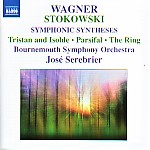José Serebrier continues his series of Stokowski transcriptions with this all-Wagner program. The outstanding item is the “Symphonic Synthesis” from Tristan and Isolde, which consists of the Liebesnacht sandwiched in between the more familiar Prelude and Liebestodt. Serebrier continues to amaze in his ability to conjure a remarkably lush string tone from his Bournemouth forces, and the performance really does capture that Stokowskian sheen more successfully than any other series dedicated to the maestro’s transcriptions (think Bamert on Chandos, for example).
But if Serebrier does better than most of the modern competition, he still has Stokowski himself to contend with. The Entry of the Gods into Valhalla faces stiff competition from Stokowski’s Phase 4 Decca version, while the Magic Fire Music (absent Wotan’s Farewell) never has been better than in Stoki’s demented Everest rendition (now available from Arkivmusic.com “on demand”). In both cases Serebrier misses some of the glitz and glamour, especially from the harps, despite the big, fat sonority of the brass section. In the “Entry” he’s also fractionally too slow.
Stoki’s Parsifal Act 3 Symphonic Synthesis also can be found on the same Everest disc with the Magic Fire Music, but here Serebrier is every bit as persuasive, and much more naturally recorded. There are no “special effects” in this piece, and so we can appreciate all the more just how successfully these Bournemouth players recapture Stokowski’s unique timbral vocabulary. So although this latest release doesn’t quite rise to the exalted level of its predecessors, it’s still extremely fine, and further evidence of the power the conductor has over the sound the orchestra makes. It’s common today to hear people complain that orchestras all sound more or less the same, but as Serebrier makes clear, so do conductors, and they have less excuse.
































